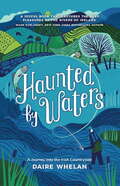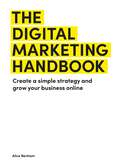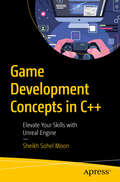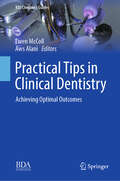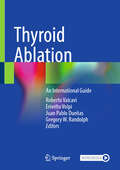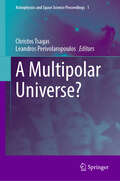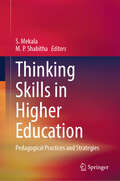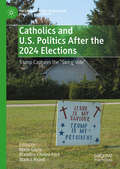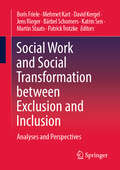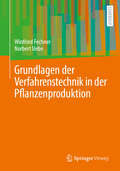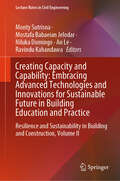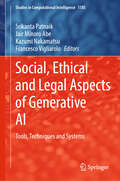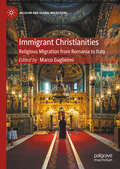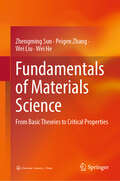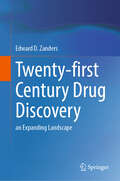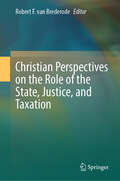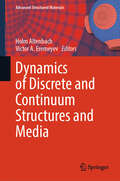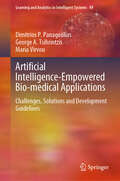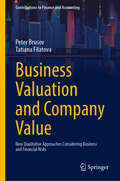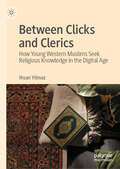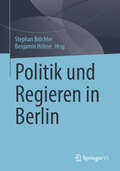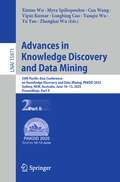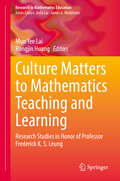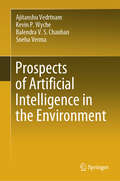- Table View
- List View
Haunted by Waters: A Journey into the Irish Countryside
by Daire WhelanAward-winning producer and journalist Daire Whelan had reached the end of another busy week and couldn't shake the feeling that life was passing him by too quickly. Vowing to make a change, he decided to commit to a year of fly fishing and set about planning his route through the wild and rugged landscape of Ireland. Here, in Haunted by Waters: A Journey into the Irish Countryside we travel with Daire throughout a season of fly fishing. But as he searches for a sense of meaning, meeting kindred spirits as he explores the rivers and lakes, Daire finds himself rediscovering the majestic beauty of his native country. From fishing on our most secluded bays and wildest loughs in Connemara and Kerry, to casting a line on the rippling waters of the Suir in Tipperary, catching salmon on the Blackwater in Waterford, and the serenity of the Dodder in Dublin on a workday afternoon, Haunted by Waters is an evocative and stunning love letter to Ireland through a sport rich in tradition and storytelling.
The Digital Marketing Handbook: Create a simple strategy and grow your business online
by Alice BenhamFrom strategist, speaker and podcaster Alice Benham comes The Digital Marketing Handbook - an expert guide covering the fundamentals of marketing, filled with case studies and interviews with industry insiders.There's so much marketing expertise out there but how should people know what to listen to? How to implement it? Or where to start? By covering the fundamentals of marketing, this book will act as a north star for small business owners looking to grow. Like Alice herself, the book is honest, practical, engaging and actionable - no fluff or complication allowed - and will help you build a community, get visible and make sales. Rooted in theory but with real-life experiences and case studies from entrepreneurs who have made digital marketing work for them, the book will leave you with the clarity and systems to take your business to the next level. An indispensable resource for small business owners, freelancers, entrepreneurs and marketing students.Here's what to expect from the book:Proven and practical expertise Clear definitions (no jargon!) Quick tips Examples and case studies Insights from trusted experts Chapter summaries for easy reminders Action steps for every topic
Game Development Concepts in C++: Elevate Your Skills with Unreal Engine
by Sheikh Sohel MoonLeverage Unreal Engine to implement a wide variety of mechanics using C++. This book arms you with the knowledge and practices of game mechanics programming in C++, supported by detailed mathematical and programmatic explanations. Detailing everything from collision mechanics and AI pathfinding to networking and advanced physics, this book offers a holistic approach to game development, ensuring you get the most out of your gameplay experiences. You will work on character mechanics, environmental interactions, combat systems, and visual effects, gaining a thorough understanding of how to implement these features in C++. By the time you finish this book, you will be able to create complex game mechanics and to make your projects optimization-intensive and performance-driven. Whether you want to polish your skills or experiment with new techniques, Game Dev Concepts in C++ for Unreal Engine Practitioners gives you the right guidance and helps you to stand out in this competitive world of game development. What You Will Learn Understand detailed scenarios that demonstrate how each mechanic is applied in real-world game development projects. Utilize ready template codes for quicker implementation of mechanics in your games, saving time, and boosting productivity. Develop your skills in advanced Unreal Engine and C++ programming, making you a versatile and proficient game developer. <span lang="EN-IN" style="font-size: 12.0pt; font-family: 'Arial',sans-serif; mso-fareast
Practical Tips in Clinical Dentistry: Achieving Optimal Outcomes (BDJ Clinician’s Guides)
by Aws Alani Ewen McCollThis book is a comprehensive collection of practical tips across a variety of specialties for the whole dental team. It includes hands-on advice collected over many years on the diagnosis, treatment, management, and care of the dental patient. The book starts with a section on core principals and fundamentals of restorative dentistry. The following sections discuss practical tips in the different disciplines of dentistry including endodontics, dental trauma, periodontics, orthodontics, paediatric dentistry, removable prosthodontics as well as oral surgery and implantology. The book concludes with a section on practice management and well-being. Written in an easy-to-understand practical way including key points for busy clinicians and many clinical images, this book is a valuable companion for undergraduate students, recently qualified dentists and all practicing dental team members.
Thyroid Ablation: An International Guide
by Gregory W. Randolph Roberto Valcavi Erivelto Volpi Juan Pablo DueñasMinimally invasive ultrasound (US)-guided thyroid treatment modalities are becoming effective and safe alternatives to classic surgeries in patients with benign thyroid cysts, solid nonfunctioning benign thyroid nodules that grow or become symptomatic, and in solid hyper-functioning nodules. In addition, they have an effective role in the management of primary micropapillary tumors or recurrent thyroid cancers in patients not suitable for surgery or patients who decline it. The aim of this international guide on thyroid ablative procedures is to enhance knowledge on thyroid ultrasound-guided, thermal ablative techniques as well as to thoroughly inform readers on the diagnosis, indications, technologies and techniques used for thyroid ablation, side effects, international guidelines and future directions. In this guide, first-class experts from diverse countries share their knowledge on the state of the art of available ultrasound-guided thyroid minimally invasive procedures. The most popular system for the thyroid gland is radiofrequency ablation (RFA), hence a special focus is on RFA, though other technologies have been proposed for thyroid ablation and are presented in the book. Advantages and disadvantages of each technology and techniques are discussed. This guide is particularly rich in illustrations and videos, as thyroid ablative therapies are image-guided.
A Multipolar Universe? (Astrophysics and Space Science Proceedings #1)
by Leandros Perivolaropoulos Christos TsagasThis volume presents cutting-edge research on one of modern cosmology's most intriguing challenges: the observed dipolar anisotropies that appear to conflict with the standard ΛCDM cosmological model. Through its contributed chapters, the book extensively examines multiple lines of evidence suggesting directional preferences in various cosmological observations, from cosmic expansion to galaxy cluster distributions. The work explores two fundamental possibilities: either these dipoles represent genuine spacetime anisotropy, challenging the cosmological principle itself, or they indicate a need to revise our interpretation of the cosmological data and the current models of large-scale structure formation. Both scenarios carry profound implications for our understanding of the universe's fundamental nature and evolution. This comprehensive collection bridges theoretical frameworks with observational evidence, offering fresh perspectives on cosmic isotropy, dark energy, and structure formation. The volume includes detailed analyses of various dipolar signals, their potential systematic origins, and theoretical frameworks that might accommodate these observations. The proceedings appeal to a broad audience of researchers working on both theoretical and observational cosmology, with experience and expertise levels ranging from that of senior researchers to those of postgraduate students. The same is also true for astrophysicists and physicists with expertise other than cosmology.
Thinking Skills in Higher Education: Pedagogical Practices and Strategies
by S. Mekala M. P. ShabithaThis edited volume illustrates the need for imparting thinking skills in education and workplace training to excel in the 21st century. It deals with the diversity of thinking skills in all domains. It is a valuable resource to understand human cognition and its interaction with human emotion for better social cognition in this digitalized era. This book assists in selecting appropriate thinking skills to be applied in the multitasking environment. It also offers essential strategies to be employed by the learners and teachers for improving thinking skills in the teaching-learning context and the workplace. The book also provides solutions for coping with the cognitive strain evident while performing complex tasks. It comprises six sections. Each section addresses different thinking skills related to social cognition, meta-emotion, meta-thinking, digital thinking, workplace thinking, lateral thinking, innovative thinking, positive activating thinking, thinking skills in language production, achievement motivation and pragmatic thinking. Thinking skills and strategies examined in the chapters are participative, diverse and interconnected, fostering individuals to think collectively to get innovative solutions in complex situations. This book is a valuable resource for Educators, Researchers, Skill Trainers, Strategic Trainers, Trainers of Thinking skills in the corporate sector, and individuals who aspire to be effective thinkers in society.
Catholics and U.S. Politics After the 2024 Elections: Trump Captures the "Swing Vote” (Palgrave Studies in Religion, Politics, and Policy)
by Mark J. Rozell Marie Gayte Blandine Chelini-PontThis book examines the evolution of the Catholic vote in the US and the role of Catholic voters in the 2024 national elections. There is a paucity of academic books on Catholic voters, even though they comprise nearly one-quarter of the US national popular vote (known as the &“swing vote&”). Understanding the intersection of religion, politics, and election outcomes in the US requires an analysis of the role played by Catholics. Catholic voters had a powerful influence on the re-election of Donald Trump and this volume untangles how the swing vote swung Right in 2024.The key topics are whether Trump&’s Catholic outreach and commitment to social issues were key to his achieving a majority of the Catholic vote; the role of the Catholic bishops in US elections; the important role of the Catholic Latino vote in US elections; the conservative Catholic and evangelical alliance in US politics; and the distinctive politics of social justice Catholics and socially conservative Catholics.
Social Work and Social Transformation between Exclusion and Inclusion: Analyses and Perspectives
by David Kergel Mehmet Kart Bärbel Schomers Boris Friele Jens Rieger Katrin Sen Martin Staats Patrick TrotzkeThe volume provides a theoretically grounded and practice-oriented perspective on socio-technical transformation processes in the field of social work. It focuses on the potentials for inclusion as well as the dynamics of exclusion that arise from these socio-technical transformation processes. Although the analytical focus is committed to the paradigms of social work, these analyses are relevant far beyond the field of social work: As a form of ethical practice, social work offers the opportunity to test, reflect on, and place alternative social practices within broader societal contexts in an increasingly diverse society.
Grundlagen der Verfahrenstechnik in der Pflanzenproduktion: Beschreibung, Analyse und Bewertung von landwirtschaftlichen Verfahren
by Winfried Fechner Norbert UebeDieses Buch bietet ein umfangreiches Grundlagenwissen zur Anwendung, Entwicklung und Bewertung von Verfahren der Pflanzenproduktion. Es richtet sich als Lehrbuch an Studenten der Landwirtschaft und der Landtechnik, an Entwicklungsingenieure der Landtechnikindustrie, Praktiker im Landwirtschaftsbetrieb und Auszubildende in der Berufsausbildung. Das Buch enthält die wichtigsten Definitionen der landwirtschaftlichen Verfahrenstechnik. Es werden an praktischen Beispielen die Verfahrenskosten und Kapazitätsbedarfe bestimmt. Die Arbeitsweise von Maschinen auf landwirtschaftlichen Feldern wird erläutert. Methoden zur Analyse und Bewertung von Verfahren werden vorgestellt. Spezifische Faktoren der Verfahrensgestaltung, wie durchschnittliche Schlaglängen, Transportleistung, Bunkerkapazität, Ernteverluste, eingesetzte Ressourcen usw., werden berücksichtigt. Zeitstudien bilden eine wichtige Basis für die Verfahrensbewertung. Die Auswertung von Zeitstudien wird am Beispiel eigener Messungen beschrieben. Der Transport ist als Querschnittsaufgabe Bestandteil vieler Verfahren. Die beim Einsatz der Maschinen entstehenden transportverbundenen Arbeitsverfahren mit einfachen und verzweigten Transportketten werden hinsichtlich Leistungsfähigkeit und möglicher ablaufbedingter Wartezeiten analysiert und bewertet. Ziel ist es, den Leser zu befähigen, eine betriebsspezifische Verfahrensauswahl zu treffen und die Maschinen effizient einzusetzen.
Creating Capacity and Capability: Resilience and Sustainability in Building and Construction, Volume II (Lecture Notes in Civil Engineering #563)
by Monty Sutrisna Ravindu Kahandawa Mostafa Babaeian Jelodar Niluka Domingo An LeThis three-volume book is the proceeding of the 46th Australasian Universities Building Education Association (AUBEA) 2023 Conference which brings together papers on construction and built environment education and practice. This particular conference theme, &“Creating Capacity and Capability: Embracing Advanced Technologies and Innovations for Sustainable Future in Building Education and Practice&” is closely related to a flagship national research programme funded by the Government of New Zealand, known as the CanConstructNZ research programme, aiming to balance the capacity and capability in the construction industry and the national pipeline of construction projects. The capacity and capability of our construction industry in fulfilling the construction needs of the whole nation are reflected in the national pipeline of construction projects and have long been recognised as one of the main challenges facing the construction sector. The practices and education of building and construction play an important role in determining the capacity and capability of the construction industry. Within the context of achieving sustainable future and embracing advanced technologies to create capacity and capability in the construction sector, various concepts, research, and innovative development have emerged and taken place. This particular conference theme has facilitated more in-depth discourses and discussions on the latest ideas and innovation within the building and construction education and practice, not only from the Australasian region but also from the wider international community, including the USA, the UK, Brazil, South Africa, Nigeria, China, and Sri Lanka. The contents of this book will be of interest to academic researchers, industry professionals and policy makers alike.
Social, Ethical and Legal Aspects of Generative AI: Tools, Techniques and Systems (Studies in Computational Intelligence #1185)
by Srikanta Patnaik Jair Minoro Abe Kazumi Nakamatsu Francesco VigliaroloSocial, Ethical & Legal Aspects of Generative AI: Tools, Techniques, and Systems highlights the transformative exploration of the AI revolution. This groundbreaking discourse deciphers the nexus between cutting-edge generative AI tools and the societal framework that shapes their impact. Generative AI is more than a technological marvel; it&’s a societal force reshaping industries, education, healthcare, and governance. Explore the ethical dilemmas, legal challenges, and innovative solutions driving its global adoption. This volume provides an insight into the latest innovations and state-of-the-art research in the fields of Social, Ethical & Legal Aspects of Generative AI, showcasing their potential to address AI's profound societal implications. It spans a diverse array of topics, including: Advanced AI-driven creative tools revolutionizing industries. Navigating the legal landscape of generative technologies. Addressing biases, data privacy, and societal inclusivity. Shaping a future where technology and humanity coexist harmoniously. By merging cutting-edge theoretical insights with practical applications, this volume provides researchers, practitioners, and students with the essential knowledge and tools to explore and advance within the dynamic field of Social, Ethical & Legal Aspects of Generative AI. Generative AI technologies bring transformative potential but also raise critical questions about privacy, bias, and accountability, demanding ethical frameworks to guide their development and deployment. The social implications of generative AI include its impact on employment, creativity, and human interactions, necessitating balanced approaches to ensure inclusivity and equity. Legal challenges surrounding generative AI focus on intellectual property, liability for AI-generated content, and adherence to global data protection laws. Addressing the ethical, social, and legal aspects of generative AI is essential to fostering innovation while safeguarding human rights and societal well-being.
Immigrant Christianities: Religious Migration from Romania to Italy (Religion and Global Migrations)
by Marco GuglielmiOver the past two decades, Romanian immigration to the Italian Peninsula has grown to nearly a quarter of the country&’s foreign population, making it the largest Romanian diaspora in the world. This volume is the first to examine the religious dimension of this vast migratory phenomenon from multiple perspectives, including sociology, anthropology, ethnology, history, and theology.The chapters study the patterns and transformations of Romanian Churches and Christian movements in Italy, with particular attention to the Romanian Orthodox Church, the Romanian Roman Catholic Church, the Romanian Greek-Catholic Church, and the Romanian Pentecostal Church. They also analyze how these immigrant Churches and religious movements engage with Italian society and respond to contemporary challenges.Drawing on the study of the Romanian diaspora and grounded in a multidisciplinary perspective, this volume develops the notion of immigrant Christianities. The latter provides a heuristic framework for highlighting the growing entanglements and transformative dynamics shaping the multiplicity of immigrant Churches and Christian movements in the contemporary world.
Fundamentals of Materials Science: From Basic Theories to Critical Properties
by Wei Liu Wei He Zhengming Sun Peigen ZhangThis book introduces the fundamentals of materials science and is intended to be used by undergraduate students in materials-related majors mainly in China. The book focusses on the basic theories of the three primary types of solid state materials (metals, ceramics and polymers) and composites and emphasizes the relationships between the structures and properties of materials. In addition, it presents the crystal structure, imperfections, microstructure, material processing and performance of the materials from the electronic and atomic levels. The physicochemical processes in materials such as diffusion, phase diagram and phase transition are also explained from the thermodynamic point of view. To highlight the fundamental role of the materials science to the modern technologies and the development of the society, the materials science-related content about Nobel Prizes is introduced in this book. Exercises and questions are included at the end of each chapter for students to practice and gain hands-on experience. Given its scope, this book is of interest to undergraduate students major in materials science and engineering and other related areas and is also beneficial for researchers, graduates and engineers with interdisciplinary backgrounds.
Twenty-first Century Drug Discovery: an Expanding Landscape
by Edward D. Zanders&‘Twenty-first Century Drug Discovery – an Expanding Landscape&’ follows on from the author&’s previous book &‘The Science and Business of Drug Discovery – Demystifying the Jargon&’, published by Springer as a second edition in 2020. While many of the key scientific and commercial features of drug discovery described in the latter are essentially unchanged since publication, the underlying science has advanced rapidly thereby presenting a broad landscape of opportunities for biopharmaceutical discovery in the twenty-first century and beyond. However, these wide-ranging and complex discovery opportunities are difficult to convey in a short period of time. This book overcomes the problem by giving readers time to study the relevant material at their leisure. Starting with a short overview of the current technical and commercial background to drug discovery and development, the book focuses on the discovery of novel targets and therapeutic agents. The latter are no longer just small molecules, but include engineered proteins, microbes and immune cells created as a result of advances in molecular cell biology and computational methods, among others. These discovery activities are presented as part of a group of &‘systems&’ under the headings of Genetics, Cell Biology, Microbiome, Immune and Nervous Systems, none of which are mutually exclusive and all of which depend upon lab-based and computational technologies. These technologies are covered in some detail, highlighting in particular, single molecule and cell analysis, selective drug target degradation and machine learning.
Christian Perspectives on the Role of the State, Justice, and Taxation
by Robert F. van BrederodeThis book, Christian Perspectives on the Role of the State, Justice, and Taxation, examines the historical and ongoing influence of Christian ethical thought on taxation, governance, and distributive justice. Building on themes introduced in Political Philosophy and Taxation (Springer, 2022), which focused on secular perspectives, this sequel shifts attention to the contributions of Christian thinkers from Medieval times to the present. The book explores key questions surrounding the role of the state, the relationship between the state and its subjects, the moral right to tax, and what constitutes fairness in taxation. It investigates how Christian ethical teachings have shaped Western political philosophy, particularly in the context of distributive justice, and evaluates their relevance in contemporary discussions. By analyzing the intersection of theology, ethics, and political philosophy, this book provides a deeper understanding of how Christian traditions have influenced historical notions of justice, fairness, and governance. It offers insights into how these principles can inform modern policy debates and ethical considerations in taxation. This book serves as a valuable resource for scholars, students, and professionals interested in religious ethics, political philosophy, and public policy. It invites readers to reflect on the enduring impact of Christian thought on concepts of justice and the responsibilities of the state.
Dynamics of Discrete and Continuum Structures and Media (Advanced Structured Materials #221)
by Holm Altenbach Victor A. EremeyevThis volume is dedicated to the sixtieth birthday of Prof. Alexey Porubov and contains a selection of scientific papers prepared by papers by his friends and colleagues from different countries. It is devoted to actual research in dynamics considering discrete and continuum models of continuum and structures. It includes microstructures modeling the behavior of materials and offers new theoretical approaches in dynamics with applications. There has been rapid development in the field of continuum mechanics in recent years. This has led to new theoretical concepts, e.g., better inclusion of the microstructure in the models describing material behavior. At the same time, there are also more applications for the theories in engineering practice. The book gives a new insight into the current developments.
Artificial Intelligence-Empowered Bio-medical Applications: Challenges, Solutions and Development Guidelines (Learning and Analytics in Intelligent Systems #49)
by Maria Virvou George A. Tsihrintzis Dimitrios P. PanagouliasThe book delves into advancements in personalized medicine, highlighting the transition from generalized treatments to tailored strategies through AI and machine learning. It first emphasizes the role of biomarkers in training predictive models and neural networks, enhancing disease diagnosis and patient management. It then explores AI-driven healthcare systems, particularly the use of microservices to improve scalability and management. Additionally, it examines regulatory challenges, the need for AI explainability, and the PINXEL framework, which defines explainability requirements using the technology acceptance model (TAM) and the diffusion of innovation theory (DOI). Furthermore, the book evaluates the capabilities of large language models, including ChatGPT and GPT-4V, in medical applications, with a focus on diagnosis and structured assessments in general pathology. Lastly, it introduces an AI-powered system for primary care diagnosis that integrates language models, machine learning, and rule-based systems. The interactive AI assistants &“Med|Primary AI assistant&” and &“Dermacen Analytica&” leverage natural language processing, image analysis, and multi-modal AI to enhance patient interactions and provide healthcare professionals with high-accuracy, personalized diagnostic support. By taking a holistic approach, the book underscores the integration of AI into healthcare, aiming to support medical professionals in patient diagnosis and management with precision and adaptability.
Business Valuation and Company Value: New Qualitative Approaches Considering Business and Financial Risks (Contributions to Finance and Accounting)
by Peter Brusov Tatiana FilatovaBusiness valuation and company value play a very important role in making an informed investment decision; buying and selling shares and bonds of a company on the stock market; insurance; taxation, etc. This book develops new approaches to business valuation and company value. The existing methods of business and company valuation have many shortcomings, two of which are global, related to the impossibility of estimating one of the fundamental parameters of valuation – the discount rate, and the impossibility of correctly accounting for the retrospective period of valuation. Both of these shortcomings can currently be overcome only within the framework of the modern theory of Brusov-Filatova-Orekhova (BFO), which is done in this monograph, devoted to the development of a qualitatively new approach to the valuation of businesses and companies. The second most important method of business valuation – CAPM – was generalized by the authors to include financial risk along with business risk, and for the first time this was done correctly. A new model – CAPM 2.0 – was created and applied to many companies. And finally, CAPM 2.0 was included in the modern theory of Brusov-Filatova-Orekhova (BFO), which allows for a correct assessment of a business and a company, taking into account both business and financial risks, illustrating the practical application of the developed innovative approach.
Reflexionsgespräche zwischen Lehrkräften und Schüler*innen im Sportunterricht der Sekundarstufe I: Entwurf einer empirisch gestützten Typologie (Bildung und Sport #39)
by André MeisterReflexionsprozesse durch Gespräche anzustoßen, auf Ebene der Gespräche zu begleiten und selbst zu durchlaufen, kann als besondere Anforderung an Sportlehrkräfte betrachtet werden. Die Studie stellt heraus, dass Reflexionsgespräche zwischen Sportlehrkräften und Schüler*innen situativ variieren und widmet sich der Frage, wie und wozu Reflexionsgespräche im sportunterrichtlichen Alltag geführt werden. Die entwickelte Typologie von Reflexionsgesprächen kann als Ausgangspunkt für differenzierte Betrachtungen von Reflexionsphasen im Sportunterricht fungieren.
Between Clicks and Clerics: How Young Western Muslims Seek Religious Knowledge in the Digital Age
by Ihsan YilmazThis book explores the lived experiences of young Muslims in Australia, the United Kingdom, and the United States as they seek religious guidance in an increasingly digital world. Based on extensive qualitative research—including interviews with 122 young Muslims—it examines how faith, identity, and knowledge come together in modern society. In doing so, the book looks at the role of imams in diaspora communities, the trust (or skepticism) placed in online religious sources, and the influence of family, friends, and digital religious figures. Between Clicks and Clerics captures the shifts in religious learning as young Muslims turn to both traditional and digital sources. Through firsthand narratives, this book highlights the voices of young Muslims as they work through questions of authenticity, authority, and independence in their spiritual journeys. It shows how they balance tradition with modern life, skepticism with belief, and personal choice with community expectations. As religious authority spreads beyond traditional figures, this book examines how Islamic knowledge is changing in the Anglosphere and what it means for the future.
Politik und Regieren in Berlin
by Stephan Bröchler Benjamin HöhneDer Sammelband liefert komprimiertes Wissen über Strukturen, Akteure, Prozesse sowie wichtige landespolitische Politikthemen. Der Band ist die erste umfassende Darstellung der facettenreichen Politik und Verwaltung des Landes Berlin. Die Beiträge behandeln die Grunddimensionen des Berliner Regierens auf Landesebene als auch die Wechselbeziehungen zum Bund und zur EU. Gegenstand im Detail ist die Darstellung des ausdifferenzierten politischen Systems Berlins und seiner Institutionen, wie Abgeordnetenhaus, Senatsregierung und Verwaltung, Verfassungsgericht, Parteien und Wahlen, direkte Demokratie und politische Kultur. Darüber hinaus werden traditionelle wie neu hinzugekommene landespolitische Politikfelder in den Blick genommen, u.a. die Finanz- und Wohnungspolitik, Innere Sicherheit, Migration, Gleichstellung, Antisemitismus und Digitalisierung.
Advances in Knowledge Discovery and Data Mining: 29th Pacific-Asia Conference on Knowledge Discovery and Data Mining, PAKDD 2025, Sydney, NSW, Australia, June 10–13, 2025, Proceedings, Part II (Lecture Notes in Computer Science #15871)
by Longbing Cao Myra Spiliopoulou Vipin Kumar Can Wang Yu Yao Xintao Wu Yanqiu Wu Zhangkai WuThe five-volume set, LNAI 158710 - 15874 constitutes the proceedings of the 29th Pacific-Asia Conference on Knowledge Discovery and Data Mining, PAKDD 2025, held in Sydney, New South Wales, Australia, during June 10–13, 2025. The conference received a total of 557 submissions to the main track, 35 submissions to the survey track and 104 submittion to the special track on LLMs. Of these, 134 papers have been accepted for the main track, 10 for the survey track and 24 for the LLM track. 68 papers have been transferred to the4 DSFA special session. The papers have been organized in topical sections as follows: Part I: Anomaly Detection; Business Data Analysis; Clustering; Continual Learning; Contrastive Learning; Data Processing for Learning; Part II: Fairness and Interpretability; Federated Learning; Graph Mining and GNN; Learning on Scientific Data; Part III: Machine Learning; Multi-modality; OOD and Optimization; Recommender Systems; Representation Learning and Generative AI; Part IV: Security and Privacy; Temporal Learning; Survey; Part V: LLM Fine-tuning and Prompt Engineering; Fairness and Interpretability of LLMs; LLM Application; OOD and Optimization of LLMs.
Culture Matters to Mathematics Teaching and Learning: Research Studies in Honor of Professor Frederick K. S. Leung (Research in Mathematics Education)
by Rongjin Huang Mun Yee LaiThis book, compiled in honor of Chair Professor Frederick K. S. Leung, contributes to revisiting, renewing and enriching the knowledge of cultural matters to mathematics education, widening the horizon in the use of cultural perspectives to explain the characteristics of classroom teaching and learning in East Asia, and to explain/re-interpret the differences in teacher knowledge and beliefs between East Asian and Western countries. Multiple research methods are used to explore how different cultures influence mathematics education. In particular, the book discusses the comparative studies of mathematics education, the influence of different cultures on mathematics teaching and learning, and the use of the Confucian Heritage Culture to explain the phenomenon of superior mathematics achievement of East Asian students. The research methods include qualitative approaches, quantitative approaches (such as structured equation modelling, exploratory factor analysis and confirmation factoranalysis), case studies and a meta-analysis of the literature review. This book is dedicated to Chair Professor Frederick K. S. Leung&’s (Hans Freudenthal Medallist 2013 and President of ICMI 2021-2024), one of the pioneers in investigating the cultural differences in mathematics education and establishing a framework for the relationship between cultures and mathematics educations. This book acknowledges his many contributions to the field and showcases promising research advancements that sparked directly or indirectly from his intellectual contributions to different mathematics educators globally.
Prospects of Artificial Intelligence in the Environment
by Ajitanshu Vedrtnam Kevin P. Wyche Balendra V. Chauhan Sneha VermaThis book gives readers insight into the state-of-the-art use of artificial intelligence for the environment. It encompasses most of the significant facets of current breakthroughs in the fields of conceptions, methodologies, resources, and leading artificial intelligence solutions for the environment. This book presents research at the forefront on applications of artificial intelligence in combating climate change, natural hazards, and textile dyeing pollution (water pollution), for forecasting, assessing air quality trends, and air pollution monitoring. It explains how machine learning can prove to be an efficient technique to forecast the consumption of energy and how AI can be effective for renewable energy systems. Research in this book widens its scope to present the problems, opportunities, and directives for the application of AI systems in engine exhaust prediction. One of the new and interesting things explored is to provide and predict the rate of decay of human lung tissue (due to Particulate Matter exposure) with the help of AI in this book. Likewise, the book opens its scope to various environmental problems and focuses on giving the best solutions with an application of artificial intelligence; this feature makes this book an indispensable guide for environmental scientists and AI researchers of all levels. The book is written comprehensively so that engineering professionals, programmers, environmentalists, graduates, postgraduates, and researchers from beginning/intermediate level to advance level can be enlightened.
